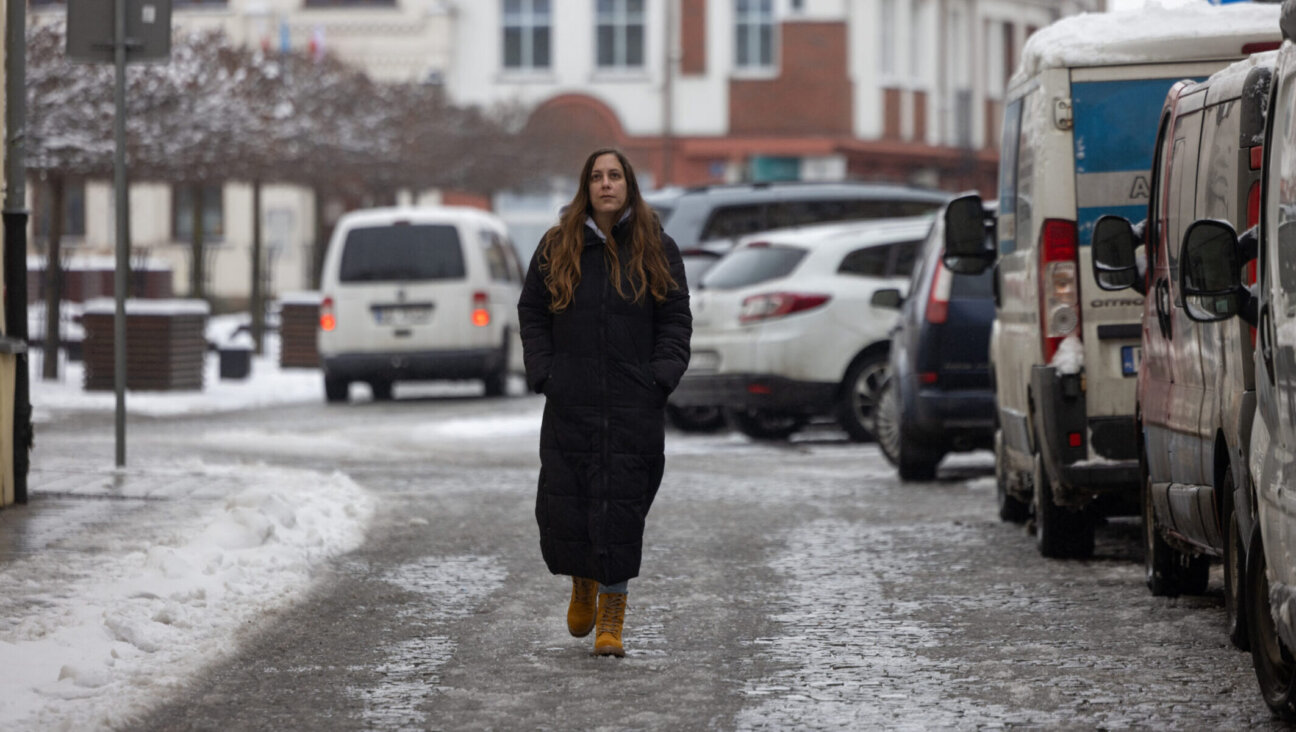When Meyer Lansky Fell in Love with a Holocaust Survivor

The Talented Mr Lansky: In Zachary Lazar’s novel “I Pity the Poor Immigrant” many of the characters assembled, such as Meyer Lansky (above) have little to do with one another. Image by Wikimedia Commons
● I Pity the Poor Immigrant: A Novel
By Zachary Lazar
Little, Brown and Company, 256 pages, $25
In photographs from my high school years, I’m often blinking against the light. My smile and shut eyes look like an evasion of the camera’s flash, of the picture itself. Looking now at that face, I imagine that I have less in common with it today than I do with the boyfriends and the ex-fiancé I loved in my 20s and 30s, and certainly less than I do with my present-day self, modified by middle-age.
That felt distance from youth is an attenuated version of the self-shirking of Hannah Groff, the main narrator in Zachary Lazar’s new novel, “I Pity the Poor Immigrant.” A divorced journalist on the cusp of 40, Hannah is so untethered to her own existence that she insists the tale that’s told by the novel — her “memoir” — is about “people mainly other than ‘me.’” By laying claim to proxies, Hannah undercuts the notion of a fixed identity: “I have come to feel like a kind of immigrant in my own life.”
Through Hannah, Lazar asks us to consider whether journalists are merely talented Mr. Ripleys or vampiric Zeligs; either way, as the book frames it, they consume the stories of others to give shape to their formless selves. Hannah leaves her home in the United States and flies to Israel to cover the slaying of a minor poet named David Bellen. Why? She’s intrigued. His death recalls the gangland-style hits that many believe were once overseen by the late gangster Meyer Lansky, the so-called mob’s accountant and a head of Murder, Inc., the real-life American crime syndicate of Jewish and Italian psychopaths, killers and creeps, including the infamous Bugsy Siegel and Lucky Luciano.
Here, as Lazar’s fans know from “Evening’s Empire” — his 2009 semi-fictional inquiry into the 1975 killing of his father, an accountant who was gunned down after getting involved with thugs practicing land fraud — the author is going full-frontal meta-reality. His new tale (within a tale) revisits the issue of how innocent, or guilty, any of us are. But of what?
As a concept novel, “I Pity the Poor Immigrant” (the book takes its title from a Bob Dylan song) works by tiling episodes from the past to reflect on the present: on Hannah’s strained relationship with her father, an antiques dealer accused of fraud; on his former affair with Gila, a Holocaust survivor who was Hannah’s Hebrew school teacher in 1980s New York and who later reemerges to ask the grown-up Hannah to write her memoir; and on Lansky’s fictional fling with the same woman, in 1972 Israel.
Many of the characters assembled here have little to do with one another, beyond the fact that their paths, or bodies, once crossed in ways that range from insignificant to staggering. Their past erotic dalliances and criminal pas-de-deuxs, their limited self-examinations and ethical evasions bring them together across the globe in combinations that strain a reader’s credulity, but that are undeniably absorbing.
History is always Lazar’s starting point. Meyer Lansky did, in 1970, file for Israeli citizenship to avoid federal charges of tax evasion, contempt and conspiracy in Miami, but he was refused and extradited back to the U.S. Famed Israeli reporter Uri Dan did interview Lansky, and he shows up in the novel to advance the action. But much of the book spins out into fantasy, with Lansky serving, symbolically, as the head of a spider whose splayed limbs represent the Shoah, the Israeli-Palestinian conflict, the clash between religious settlers and left-wing artists, the failures of fathers, and the characters’ varied takes on identity and integrity.
As for Lansky, the novel’s epigraph — a sworn statement of his from 1950 — suggests that his view of himself, a onetime child refugee from the pogroms of Belarus, was that of a tough guy made good. “I’m not a kneeling Jew,” he growls to Estes Kefauver of the U.S. Senate Special Committee on Organized Crime in Interstate Commerce, “who comes to sing songs in your ears.”
Hannah’s own bent recalls that of Lansky’s child, Sandra, as she appears in her new autobiography, “Daughter of the King: Growing Up in Gangland.” While critics have described Sandra’s depiction of Lansky as honest but superficial, Hannah is more analytic in her treatment of him. Still, she is blatantly naïve to a point that will make real journalists cringe — she seeds the Bellen article with her sexploits with a Tel Aviv journalist and stops pressing herself to draw conclusions beyond a certain point.
When Israeli airport officials note that her name is Hebrew, and ask why she never visited Israel prior to the Bellen assignment, she has no answer, thinking, “It was precisely this kind of righteous shaming that I have always taken pains to avoid.” Similarly, she squirms when she’s invited to see Yad Vashem: “Perhaps the reason I have never wanted to face too directly the idea of myself as a Jew is that all roads seem to lead to the Holocaust memorial.”
Still, Hannah’s vacancy is merely an aperture through which Lazar projects his gripping tale about history, morality and people with a far more profound conviction than Hannah — right or wrong — about who they are.
Readers with patience for multiple unreliable narrators, and their attendant blank spots and self-exculpations, will find themselves falling under Lazar’s spell in this deeply felt novel about searching — not in the vain “hope of finding an answer,” as Hannah says, “but in the hope of creating a space to think through the question.”
Susan Comninos is a frequent contributor to the Forward.
A message from our Publisher & CEO Rachel Fishman Feddersen

I hope you appreciated this article. Before you go, I’d like to ask you to please support the Forward’s award-winning, nonprofit journalism so that we can be prepared for whatever news 2025 brings.
At a time when other newsrooms are closing or cutting back, the Forward has removed its paywall and invested additional resources to report on the ground from Israel and around the U.S. on the impact of the war, rising antisemitism and polarized discourse.
Readers like you make it all possible. Support our work by becoming a Forward Member and connect with our journalism and your community.
— Rachel Fishman Feddersen, Publisher and CEO























